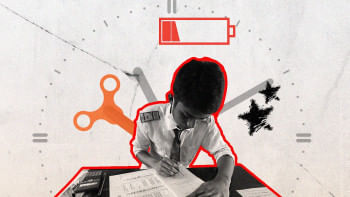Uncertainty over student evaluation must be resolved soon

That the implementation of the new school curriculum is still in a shambles, even after one and a half years of its launch, is quite disappointing. Equally concerning is the authorities' refusal to acknowledge the issues slowing its execution. A National Curriculum and Textbook Board (NCTB) survey on 2.53 lakh teachers in January found that 37.6 percent of teachers "roughly" understood the assessment system, while the rest seemingly understood it well. Educationists say many, due to a lack of training, are still not sure how to deliver lectures and form student groups as per the new curriculum. This along with preexisting systemic problems in our education system have resulted in frustration and confusion.
Yet, a member of the NCTB has claimed that teachers' training has been adequate. If that were the case, why did the NCTB survey find so many struggling to grasp the assessment system? Over one-third of teachers not being fully aligned with the system is no small matter. Moreover, the reality that students, nearly halfway through the year, still do not know how their mid-year assessment will be done is quite telling. The student evaluation method should have been finalised before classes began. And the responsibility for this failure falls on the shoulders of the authorities.
A most challenging area in education worldwide is fair and reliable assessment of what students have learned in classroom and through their own efforts. To have moved forward with the implementation of a new curriculum without first developing such a system was foolhardy, to say the least. The authorities were warned not to make such a mistake by educationists, but they did not listen. They should own up to that mistake now, instead of doubling down on their rhetoric of success.
Additionally, the NCTB is reportedly considering recalling another textbook after having already recalled two others due to pressure from Islamists. But how will giving into such pressures effect the quality of education? The manner in which the authorities are approaching issues related to the new curriculum and textbooks is deeply troubling. We urge them to heed expert suggestions, now more than ever, and the future of students must be at the top of their priority.


 For all latest news, follow The Daily Star's Google News channel.
For all latest news, follow The Daily Star's Google News channel. 










Comments